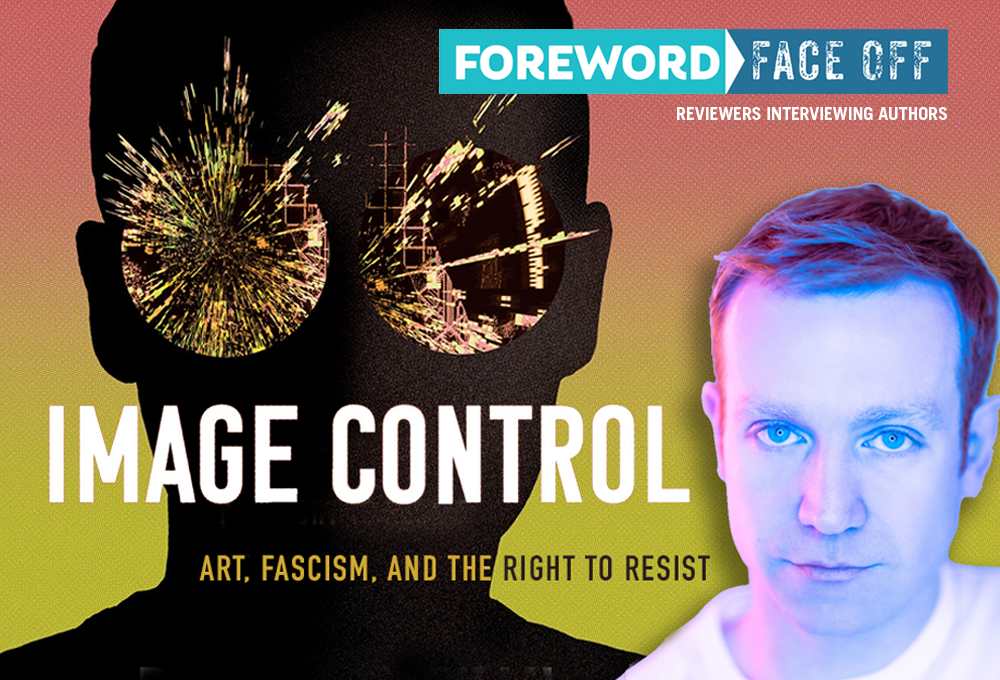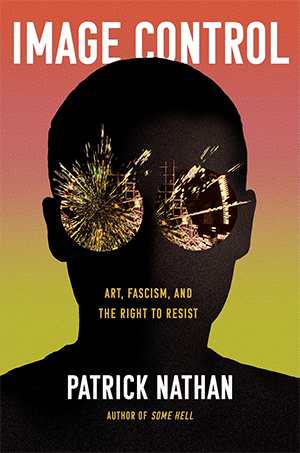Reviewer Claire Foster Interviews Patrick Nathan, Author of Image Control: Art, Fascism, and the Right to Resist

As you might imagine, some of the authors we choose to interview in Foreword This Week can be a bit intimidating to our reviewers—engaging with the heavyweight thinkers of philosophy and science, culture and, yes, even poetry requires a fair measure of confidence.
And that’s where the art of assigning reviews comes into play. Over many years of working with an A-team of reviewers, Editor-in-Chief Michelle Schingler has developed a deft hand at sizing up a book and matching it with the appropriate reviewer, one that she has no doubt is up for the task.

Today’s interview with Patrick Nathan, as thoughtful and original a writer as you’ll find, pairs him with Claire Foster, longtime reviewer for Foreword and author of two award-winning short story collections. In their starred review of Patrick’s Image Control: Art, Fascism, and the Right to Resist, Claire points to some alarming realizations about how we are shaped by the photographs and images around us, and we were dying to hear more. As you’ll see, there’s no doubt these two have earned each other’s respect.
At a time when social media analytics—not necessarily depth, artistry, or even talent—guide consumer and industry decisions, why is it important to acknowledge how images or simplified communication erases real meaning?
Because meaning influences our behavior—and our behavior is our politics. Or simply our lives. I think “erases,” too, might be the wrong metaphor. Uninterrogated images—images used in place of language, or language used as images (tweets, slogans, aphorisms, etc.)—eclipse meaning. The meaning is still there. It’s just that something very small, but from our perspective very large, is blocking out what is real, what is true.
In a solar eclipse, it could certainly seem as though the sun had been destroyed or drained of fire. That night had fallen in the middle of the day, and perhaps permanently. We know this is not the case. Ideally, our day to day experience with images (on social media, most obviously, but also traditional media, our interactions with others, and most importantly in the way people assimilate media into their speech, their thoughts, their lives) would carry the same measure of calm, the same understanding that what we’re seeing is not what is happening.
Of course the eclipse metaphor fails when you consider the impetus behind the eclipse, as far as the majority of reductive images, slogans, and so on are concerned. A solar eclipse is an astronomical event. An image eclipse is a political event: someone has put it there to deliberately occlude meaning, usually for profit. And the greater the profit, the more wealth becomes concentrated; and the greater wealth is concentrated, the easier it becomes to occlude meaning. I don’t think it’s coincidental that wealth and the reliability of truth are simultaneously more unequal, more destabilized, than they’ve been in this country for a hundred years, nor that “free speech” is both blade and wound in these mutual degradations—the enforcer and the casualty of truth; the enforcer and the casualty of determining whose speech is heard. And this has always been a function of fascism wherever it appears: to concentrate wealth and deplete the world of truth.
Like your muse Susan Sontag, you also wrote a novel (Some Hell, Graywolf Press, 2018). How does Image Control square with your understanding of fiction, and why do you think so few authors do both forms well?
Somewhere toward the end of Image Control, I say something like “A crucial word for all of us is and.” For me, fiction is that “and.” For someone else, it might be movies; for someone rather different, it might be God. While writing this book, I realized it couldn’t only work in one direction. It couldn’t only demystify; I had to respect the impulse toward mystification, the desire to eclipse or occlude. While the book begins in political urgency, it arcs toward spiritual activity, toward insisting that there is something human (necessary) in wrapping ourselves in darkness.
As a novelist, talking about fiction is how I can relate this in a nonfiction project like Image Control. I want us to understand and not understand. Fiction—like all art—is a place, and what we do there is play, experiment, rest, rejuvenate, and otherwise practice our emotional and spiritual relationships with ourselves, our environment, and each other. This is what I think certain authors—at least the ones who aren’t obviously disingenuous—mean when they say their novels are “apolitical.” It’s not that politics aren’t in the novel, and it’s not as if they stake no political claim in the world. It’s just that what they seek is more than politics. Politics is not a totality; otherwise we wouldn’t cry, to our own shock, over certain sunrises or chord changes or the way one character in a film looks at another. These are meaningless experiences that often change our lives. Art is always about that more, about that and.
Which perhaps answers the second part of your question: why so few authors succeed in both the essay and the novel (or the story). Obviously a memoir isn’t an essay, though their opaque and chunky emulsion into the “personal essay” must be confusing for a lot of readers, and has much more in common with fiction, but the essay seems, to me, like a journey that must be completed. A work of fiction doesn’t have to arrive, but an essay certainly does—meaning that the author, by the end of it, has to know what they think. Most American fiction writers don’t seem to know what they think. Which is a very American thing, to not know what you think. It’s hard to talk about this without mentioning the institutionalized obsession, over the last sixty years or so, with the aesthetics of “craft,” with the “rules” of fiction and so forth. Obviously they’re going away. I think the politics of craft, thanks to Matthew Salesses’s Craft in the Real World and the perspectives of other long-marginalized writers, is finally becoming visible for what it is: conservative, reactionary, and ultimately in the service of white supremacy and imperialism.
In short, we’d probably have a lot more writers in the United States who could give us great novels and great essays simultaneously were it not for the CIA’s “literary man,” Paul Engle, and his outsized role in establishing and standardizing the MFA workshop throughout the country. This is also, I think, why poets are the strongest moral authorities in contemporary American literature. American poets have never seemed terribly interested in rules.
Speaking of Sontag, she seems to be a presence in Image Control. What was her creative influence on this project for you? Did you have a particular message or north star when you set out to write this book?
For a few years now, Sontag has been my little bump of coke. When my attention flags or I get tired or feel stupid, I turn to one of her books—the second volume of her journals is particularly “pure” in this regard—and I feel reinvigorated, reenergized. I’ve listened to her hourlong lecture on classical pornography from 1964 about ten or twelve times, usually while cooking or cleaning, and it still gives me something. Same with her three-hour appearance on C-SPAN during the Iraq War. Unfortunately this sometimes manifests as a dependence. “There’s this Sontag quote,” I find myself saying, or “It’s like that time Sontag told an interviewer…” and so on. But then, so much of her own thinking—on art and politics, on literature, even on spirituality and being “against interpretation”—is pastiched from other writers, usually writers she was reading in French at the time. And so alongside Sontag I have Berger, Teju Cole, Sarah Schulman, Adorno, Angela Davis, Barthes, Maggie Nelson, Harold Rosenberg, Ibram X. Kendi, Foucault, Geoff Dyer, Arendt, Baldwin, Edward Said, Boris Groys, Hal Foster, David Graeber, de Beauvoir, Valeria Luiselli, and dozens of other “idea” writers whose books I’ve underlined and scrawled in and filled with articles and essays I’ve clipped out of newspapers and magazines; and I feel less dependent.
Perhaps what sets Sontag apart for me—and Teju Cole, for that matter, and Valeria Luiselli—echoes back to your previous question. The Volcano Lover is a phenomenal novel, a work of art. Open City and Lost Children Archive are works of art. These are writers who know what they think and whose “and,” whose “more,” is what I aspire to.
Since images (like RuPaul GIFs and thirst traps) often supersede meaningful writing, it was a pleasure reading a longer meditation and analysis of the influence social media has on our ability to communicate. Image Control is a wonderful example of how well-crafted sentences can break through the fascism of simplified language. What other recommendations do you have for readers who want to re-embrace semantic complexity?
Before I answer that: [heart-eyes emoji]. Thank you so much! It always means the world to me when someone notices the language for what it is, so thank you, for real.
As for instructive or illuminating writers (for un-reductive writers), I want to zero in on a single poet and essayist: Joseph Brodsky. Obviously you could read all the writers above and get a deeper sense of language, especially as it affects our thoughts and feelings, our ethical impulses, but with Brodsky the experience is not only unique, but uniquely edifying. And if you have to sample Brodsky in one individual essay, I think “On Grief and Reason”—his ultra-close reading of four Robert Frost poems—is your essay. For most of my life, Frost was another Edward Hopper, someone whose work, I assumed, didn’t really merit close attention, didn’t seem to me dynamic enough or complex enough, mostly because of its cultural associations—quotable, accessible, “American” in all the wrong ways. Worst of all, “common.” Yet just as Olivia Laing, in The Lonely City, brought a depth and sympathy to Hopper’s paintings I never could have anticipated, Brodsky’s intense appreciation for Frost’s work—particularly “Home Burial”—at last gave Frost’s poems to me. Brodsky teaches the magnetism of language magnetically, its push and pull, its energetic charge in each gap. After thousands of books, I’ve never read anyone with an eye like his. You really have to cherish that, when it happens. And to keep your own eye open for those cherishable writers.
Claire Foster
